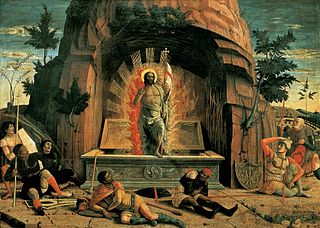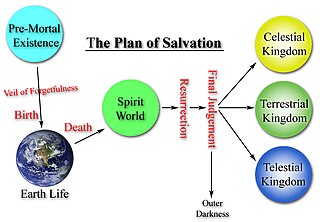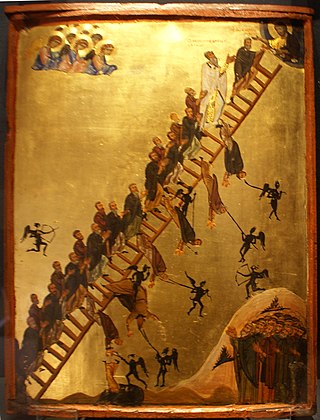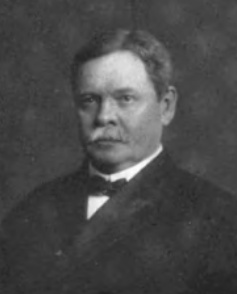Related Research Articles

The afterlife or life after death is a purported existence in which the essential part of an individual's stream of consciousness or identity continues to exist after the death of their physical body. The surviving essential aspect varies between belief systems; it may be some partial element, or the entire soul or spirit, which carries with it one's personal identity. Belief in an afterlife is in contrast to the belief in oblivion after death.

Jewish eschatology is the area of Jewish theology concerned with events that will happen in the end of days and related concepts. This includes the ingathering of the exiled diaspora, the coming of the Jewish Messiah, the afterlife, and the resurrection of the dead. In Judaism, the end times are usually called the "end of days", a phrase that appears several times in the Tanakh.

Resurrection or anastasis is the concept of coming back to life after death. In a number of religions, a dying-and-rising god is a deity which dies and is resurrected. Reincarnation is a similar process hypothesized by other religions, which involves the same person or deity coming back to another body. Disappearance of a body is another similar, but distinct, belief in some religions.
In many religious and philosophical traditions, the soul is the spiritual essence of a person, which includes one's identity, personality, and memories, an immaterial aspect or essence of a living being that is believed to be able to survive physical death. The concept of the soul is generally applied to humans, though it can also be applied to other living or even non-living entities, as in animism.

Immortality is the concept of eternal life. Some modern species may possess biological immortality.

Christian mortalism is the Christian belief that the human soul is not naturally immortal and may include the belief that the soul is "sleeping" after death until the Resurrection of the Dead and the Last Judgment, a time known as the intermediate state. "Soul sleep" is often used as a pejorative term, so the more neutral term "mortalism" was also used in the nineteenth century, and "Christian mortalism" since the 1970s. Historically the term psychopannychism was also used, despite problems with the etymology and application. The term thnetopsychism has also been used; for example, Gordon Campbell (2008) identified John Milton as believing in the latter.
The problem of Hell is an ethical problem in the Abrahamic religions of Christianity, Islam and Judaism, in which the existence of Hell for the punishment of souls in the Afterlife is regarded as inconsistent with the notion of a just, moral, and omnipotent, omnibenevolent, omniscient supreme being. Also regarded as inconsistent with such a just being is the combination of human free will, and the divine qualities of omniscience and omnipotence, as this would mean God would determine everything that has happened and will happen in the universe—including sinful human behavior.

Harvard Divinity School (HDS) is one of the constituent schools of Harvard University in Cambridge, Massachusetts. The school's mission is to educate its students either in the academic study of religion or for leadership roles in religion, government, and service. It also caters to students from other Harvard schools that are interested in the former field. HDS is among a small group of university-based, non-denominational divinity schools in the United States.
The concept of an immaterial and immortal soul – distinct from the body – did not appear in Judaism before the Babylonian exile, but developed as a result of interaction with Persian and Hellenistic philosophies. Accordingly, the Hebrew word נֶ֫פֶשׁ, nephesh, although translated as "soul" in some older English-language Bibles, actually has a meaning closer to "living being". Nephesh was translated into Greek in the Septuagint as ψυχή (psūchê), using the Greek word for "soul". The New Testament also uses the word ψυχή, but with the Hebrew meaning and not the Greek.

According to the doctrine of the Church of Jesus Christ of Latter-day Saints, the largest denomination in the Latter Day Saint movement, the plan of salvation is a plan God created to save, redeem, and exalt humankind, through the atonement of Jesus Christ. The elements of this plan are drawn from various sources, including the Bible, Book of Mormon, Doctrine & Covenants, Pearl of Great Price, and numerous statements made by the leadership of the Church of Jesus Christ of Latter-day Saints. The first appearance of the graphical representation of the plan of salvation was provided in the 1952 missionary manual entitled A Systematic Program for Teaching the Gospel.
The Paschal mystery is one of the central concepts of Catholic faith relating to the history of salvation. According to the Compendium of the Catechism of the Catholic Church, "The Paschal Mystery of Jesus, which comprises his passion, death, resurrection, and glorification, stands at the center of the Christian faith because God's saving plan was accomplished once for all by the redemptive death of himself as Jesus Christ." The Catechism states that in the liturgy of the Church "it is principally his own Paschal mystery that Christ signifies and makes present."

In religion and folklore, hell is a location or state in the afterlife in which souls are subjected to punitive suffering, most often through torture, as eternal punishment after death. Religions with a linear divine history often depict hells as eternal destinations, the biggest examples of which are Christianity and Islam, whereas religions with reincarnation usually depict a hell as an intermediary period between incarnations, as is the case in the dharmic religions. Religions typically locate hell in another dimension or under Earth's surface. Other afterlife destinations include heaven, paradise, purgatory, limbo, and the underworld.
Wilfred Cantwell Smith was a Canadian Islamicist, comparative religion scholar, and Presbyterian minister. He was the founder of the Institute of Islamic Studies at McGill University in Quebec and later the director of Harvard University's Center for the Study of World Religions. The Harvard University Gazette said he was one of the field's most influential figures of the past century. In his 1962 work The Meaning and End of Religion he notably questioned the modern sectarian concept of religion.

In Christian theology, conditionalism or conditional immortality is a concept in which the gift of immortality is attached to belief in Jesus Christ. This doctrine is based in part upon another biblical argument, that the human soul is naturally mortal, immortality is therefore granted by God as a gift. This viewpoint stands in contrast to the more popular doctrine of the "natural immortality" of the soul. Conditionalism is practically synonymous with annihilationism, the belief that the unsaved will be ultimately destroyed, rather than suffer unending physical torment in hell. The view is also sometimes connected with the idea of soul sleep, in which the dead sleep unconscious until the Resurrection of the Dead to stand for a Last Judgment before the World to Come.
The theology on the body is a broad term for Catholic teachings on the human body.
In Christianity, annihilationism is the belief that after the Last Judgment, all damned humans and fallen angels including Satan will be totally destroyed, cremated, and their consciousness extinguished rather than suffering forever in Hell. Annihilationism stands in contrast to both the belief in eternal torment and the belief that everyone will be saved ("universalism"). However, it is also possible to hold to a partial annihilationism, believing unsaved humans to be obliterated or cremated, but demonic beings to suffer forever.
General resurrection or universal resurrection is the belief in a resurrection of the dead, or resurrection from the dead by which most or all people who have died would be resurrected. Various forms of this concept can be found in Christian, Islamic, Jewish, Samaritan and Zoroastrian eschatology.
The Pillars of Adventism are landmark doctrines for Seventh-day Adventists. They are Bible doctrines that define who they are as a people of faith; doctrines that are "non-negotiables" in Adventist theology. The Seventh-day Adventist church teaches that these Pillars are needed to prepare the world for the second coming of Jesus Christ, and sees them as a central part of its own mission. Adventists teach that the Seventh-day Adventist Church doctrines were both a continuation of the reformation started in the 16th century and a movement of the end time rising from the Millerites, bringing God's final messages and warnings to the world.

Eternal life traditionally refers to continued life after death, as outlined in Christian eschatology. The Apostles' Creed testifies: "I believe... the resurrection of the body, and life everlasting." In this view, eternal life commences after the second coming of Jesus and the resurrection of the dead, although in the New Testament's Johannine literature there are references to eternal life commencing in the earthly life of the believer, possibly indicating an inaugurated eschatology.

William Wallace Fenn was a Unitarian minister and a dean of Harvard Divinity School. He served the First Unitarian Church of Chicago from 1890–1901.
References
- ↑ see for instance
- 1 2 3 4 "Harvard Divinity School: Named Lecture Series". Harvard Divinity School Library Research Guides. Harvard Library. Retrieved 13 April 2021.
- ↑ The Ingersoll Lectures on Human Immortality: Centenary Notes by Herbert F. Vetter
- ↑ Reisner, George Andrew. The Egyptian Conception of Immortality – via Project Gutenberg.
- ↑ Robinson, Marilynne (2017). "Old Souls, New World". Harvard Divinity Bulletin. 45:1-2 (Spring/Summer 2017). Retrieved 7 January 2020.
- ↑ "Video: The Liturgy of Home: Terry Tempest Williams". Harvard Divinity School. Retrieved 27 November 2019.
Harvard Divinity School Library website for the Ingersoll Lectures